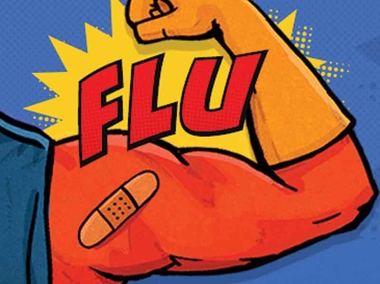Do yourself a favor – get your flu shot

December 4 through 10 is National Influenza Vaccination Week (NIVW). According to the Centers for Disease Control (CDC) there isn’t any better time to get your flu vaccination.
Flu seasons vary in severity depending on a number of factors, the CDC says, including the characteristics of circulating viruses, the timing of the season, how well the vaccine is protecting against influenza infection and how many people got vaccinated.
While the numbers vary, in the United States, millions of people are sickened, hundreds of thousands are hospitalized and thousands or tens of thousands of people die from flu every year.
There have been some changes for this year’s flu vaccinations. A principle one is that the CDC is recommending only injectable flu shots this year. In the past, there have been nasal spray vaccines available, but they are not recommended for use this season.
The vaccines have been updated to better match circulating viruses, and the recommendations for vaccination of people with egg allergies have changed.
The CDC’s general recommendation is that everyone six months and older should get a flu vaccine every year by the end of October, if possible. But because many people don’t become aware of the risks until later, the NIVW is always observed the first full week of December.
The CDC’s website says, “getting vaccinated later is OK. Vaccination should continue throughout the flu season, even in January or later. Some young children might need two doses of vaccine. A health care provider can advise on how many doses a child should get.”
In the past, it was recommended that people who are allergic to eggs should not get the vaccine. However, this year the recommendations have been updated. People who have experienced only hives after exposure to egg can get any licensed and recommended flu vaccine that is otherwise appropriate for their age and health.
People who have had more severe reactions to exposure to eggs (for example, lightheadedness, or who needed epinephrine or other emergency medical intervention) should only get their vaccination in a medical setting, such as your doctor’s office or a hospital.
If you have HIV/AIDS - People with HIV and AIDS are at high risk of serious influenza-related complications. Vaccination with a flu shot has been shown to produce an immune response against influenza viruses in certain people infected with HIV. People with HIV and AIDS are at high risk of serious influenza-related complications and should get the inactivated influenza vaccine (the flu shot). They should never receive the nasal-spray flu vaccine because it contains a weakened form of the live influenza virus and is not recommended for use in people with weakened immune systems.
If you are 65 or older - people 65 years and older are at greater risk of serious complications from the flu compared with young, healthy adults because human immune defenses become weaker with age. While flu seasons can vary in severity, during most seasons, people 65 years and older bear the greatest burden of severe flu disease.
In recent years, for example, it’s estimated that between 71 percent and 85 percent of seasonal flu-related deaths have occurred in people 65 years and older and between 54 percent and 70 percent of seasonal flu-related hospitalizations have occurred among people in that age group. So, influenza is often quite serious for people 65 and older.
The bottom line if you are 65 or older – get your flu shot.There are two vaccines designed for people 65 or older: The “high dose vaccine,” which contains four times the amount of antigen as the regular flu shot, and Fluad, which is designed to help create a stronger immune response to vaccination.
Getting an annual flu vaccine is the first and best way to protect yourself and your family from the flu. Flu vaccination can reduce flu illnesses, doctors’ visits, and missed work and school due to flu, as well as prevent flu-related hospitalizations. The more people who get vaccinated, the more people will be protected from flu, including older people, very young children, pregnant women and people with certain health conditions who are more vulnerable to serious flu complications.
Do yourself a favor. If you haven’t gotten your flu shot yet, do it now.
Copyright 2016 The Gayly – December 4, 2016 @ 11:25 a.m.





